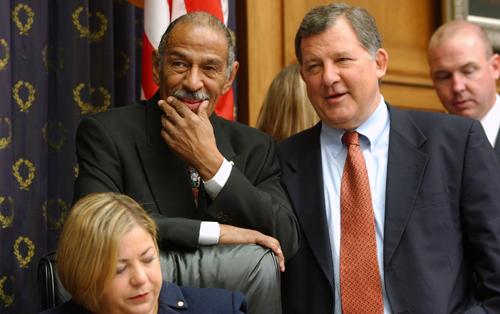House panel takes first step toward contempt of Congress proceedings against former Bush aide

House Judiciary Committee Chairman John Conyers, D-Mich., standing, left, Rep. Chris Cannon, R-Utah, right, and Rep. Linda Sanchez, D-Calif., seated, are seen during a hearing on Capitol Hill in Washington, Thursday on the firing of eight U. S. attorneys. Phil Collins
Jul 12, 2007
Last updated on May 12, 2016 at 01:27 p.m.
WASHINGTON – A House panel cleared the way Thursday for contempt proceedings against former White House counsel Harriet Miers after she obeyed President Bush and skipped a hearing on the firings of federal prosecutors.
Addressing the empty chair where Miers had been subpoenaed to testify, Rep. Linda Sanchez ruled out of order Bush’s executive privilege claim that his former advisers are immune from being summoned before Congress.
The House Judiciary subcommittee that Sanchez chairs voted 7-5 to sustain her ruling. If an agreement with the White House is not reached, the full Judiciary Committee could convene hearings and vote on whether to hold Miers, Bush’s longtime friend and former Supreme Court nominee, in contempt. Ultimately, the full House would have to vote on any contempt citation.
“Those claims are not legally valid,” Sanchez, D-Calif., said of Bush’s declaration, made Monday. “Ms. Miers is required pursuant to the subpoena to be here now.”
Get The Daily Illini in your inbox!
The White House showed no signs of backing down, pointing out that Bush was willing to make Miers and other administration officials available for interviews, but only behind closed doors and without a transcript. Democrats have rejected the offer.
“If the House Judiciary Committee wants to avoid confrontation, it should withdraw its subpoenas,” said White House spokesman Tony Fratto. “The committee is rejecting accommodation because they prefer just the kind of political spectacle they’re engaged in now.”
The question grew more pressing when Bush ordered Miers to defy the committee’s subpoena, unlike a lower-ranking former White House aide, Sara Taylor, who took a different approach Wednesday.
Acting under her own subpoena, Taylor appeared before the Senate Judiciary Committee in an attempt to satisfy both Congress and the White House and thereby avoid a contempt citation. It’s unclear whether she was successful. She answered some questions while saying she could not answer others under Bush’s directive. The Senate committee’s ranking Republican advised Taylor that she might have been on safer legal ground had she said nothing.
Saying nothing is the strategy that Miers, on Bush’s orders, adopted Thursday.
Like Taylor, Miers participated in the process of deciding which prosecutors to fire, according to e-mails released by the Justice Department. At one point, the documents showed, Miers proposed firing all 93 U.S. attorneys, but Attorney General Alberto Gonzales rejected that suggestion.
Democrats want to ask her under oath about the White House’s role in drawing up the firing list. But Bush invoked executive privilege, saying he needed to protect the flow of advice he receives from close advisers. Additionally, he declared Miers immune from subpoenas and ordered her to skip Thursday’s hearing.
Democrats were furious, declaring the White House had reached “novel legal conclusions” to justify withholding a former aide’s testimony, based only on legal opinions regarding currently serving White House officials and no court rulings.
House Judiciary Committee Chairman John Conyers, D-Mich., said the committee must take action on Miers’ noncompliance to preserve the panel’s authority.
“Are congressional subpoenas to be honored or are they optional?” Conyers asked rhetorically. “Apparently we have to run this out” to set a precedent, he added.
Utah Rep. Chris Cannon, the senior Republican on the administrative law subcommittee, challenged Democrats to submit any evidence they have to justify their “incessant investigation” that has stretched all year. He warned that without evidence of wrongdoing, any court showdown with the White House would fail.
“It’s time for the majority to stop swaggering its power in this Congress,” Cannon said.
In other action, Sanchez’ subcommittee also voted by voice Thursday to give Conyers authority to issue subpoenas to the Republican National Committee for e-mails on the prosecutor firings.
Legal scholars said the issue of Miers’ immunity is far from clear-cut.
An argument that Miers has to testify “is certainly as tenable as that she doesn’t,” University of Texas law professor Sanford Levinson says.
“If I were advising the congressional committees, what I would want to argue is that they have evidence that she was involved in what might have been criminal acts; that is, subordination of civil service hiring to unlawful considerations,” Levinson said.
George Washington University law professor Jonathan Turley said the White House “could not have picked worse ground” on which to fight executive privilege. No president has gone as far as mounting a court fight to keep his aides from testifying on Capitol Hill.





